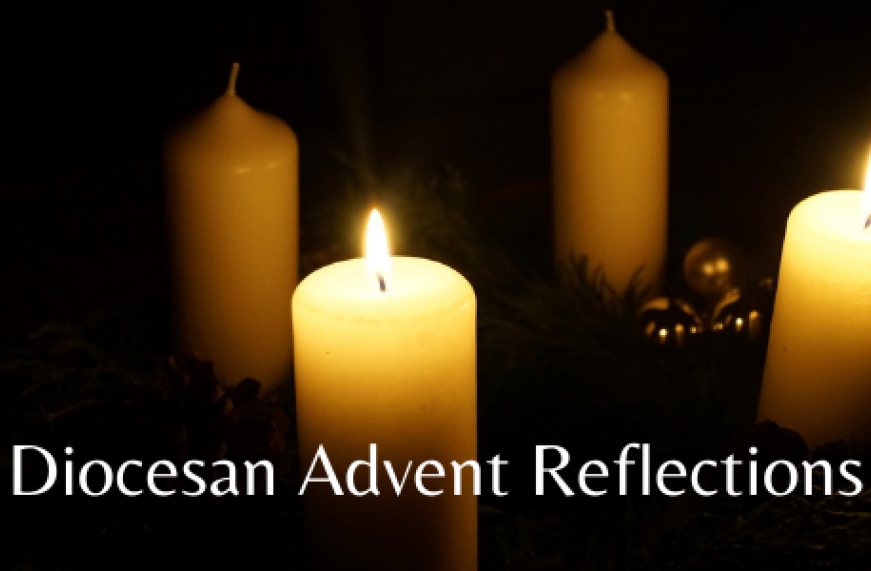Daily Advent Reflection: December 10

Second Thursday of Advent
Psalms 37:1-18 · 37:19-42
Isa. 7:1-9
2 Thess. 2:1-12
Luke 22:1-13
Three of the lessons designated for this day include a common theme: references to living in an anxious time, awaiting a better future—surely a condition we know all too well, in our here and now.
In Isaiah, we read about an alliance between two kingdoms, an alliance which causes the House of David and its leader to shake with fear, “as the trees in the forest shake before the wind.” But the Lord instructs Isaiah to say to them: “ ‘It shall not stand,/and it shall not come to pass.’” But in order for the House of David to be maintained, the people must have faith. “ ‘If you will not believe,/surely you shall not be established.’”
In Paul’s second letter to the Thessalonians, he reminds the brethren to whom he is writing that before the returning of the Lord Jesus, they must anticipate and endure a time of tribulation: “that day will not come, unless the rebellion comes first, and the man of lawlessness is revealed, the son of perdition.”
In both cases, we read of people who can look forward to a day of deliverance, but who must first endure hardships.
Psalm 37 develops this idea fully. The Oxford Annotated Bible provides a note which identifies the Psalm’s theme: “The certainty of retribution for the wicked. . . The argument is directed to those discouraged by the injustices which apparently dominate the world.”
How apt that seems to us, today. How is it possible to see the injustices of our own time and in our own place, and not be discouraged? We live in an age of bitter political and cultural division. We live in a society in which wealth is unevenly distributed. We see that racial discrimination seems to be inextricably wound into our social and political fabric. We live in a season of pandemic, a time in which we all have fears for our health, and the health and well-being of those we love. But we see also that even this illness seems unjustly to target the most vulnerable and disproportionately to infect communities of color. Like the audience of the Psalm, we seem to live in a world dominated by negative and malicious powers beyond our control.
The wicked who seem to dominate in the Psalm carry out “evil devices,” they use violence against the “poor and needy,” they seek to slay the righteous. But the Psalmist looks to a future in which the power of the wicked will be overcome, when they will “fade like the grass.” Their own violence will be turned against them. They will cease to exist, and their “posterity... shall be cut off.”
But in the meantime, the Psalmist’s words of encouragement provide encouragement that we also can turn to in these days. The righteous are told not to fret, not to worry, to avoid anger and wrath, to do good and turn away from evil. To be still. To wait patiently. To wait for the Lord and keep his way.
This patient, faithful waiting, accompanied by actions of goodness will lead, the Psalmist says, to the promised deliverance. That deliverance is not simply retribution toward the wicked, but a fulfillment which the righteous can now anticipate, and, in the future, enjoy. Again and again, it is promised that the righteous will “possess the land.” Along with that, the righteous will “receive the desires of your hearts,” they will “delight themselves in abundant prosperity.” They will gain “salvation” and deliverance from the Lord. And the fulfillment is not theirs alone; rather, they are assured that “their heritage will abide forever” and, for the man of peace, “there is posterity.”
The idea of a future fulfillment is a link that ties these three readings to the reading from Luke’s gospel. In this reading, the narrative sets forth the instructions Jesus give his disciples for the preparation of the Passover meal. Inserted in between the reference to the upcoming Passover and the instructions is the information that “Satan entered into Judas called Iscariot” and a description of the plot he arranges with the chief priests and scribes to betray Jesus. We know that the lawless man, the wicked enemy will in a few hours triumph, and, over the next days, will seemingly overwhelm the righteous. But with the promise inherent within the Passover meal, we also know that the righteous one will prevail at last, and that, in the memorial of the Eucharist, we as members of Christ’s heritage and posterity will in the fullness of time live abundantly in the land that has been given us.
Mabel DuPriest
St. Luke’s Episcopal Church, Racine
